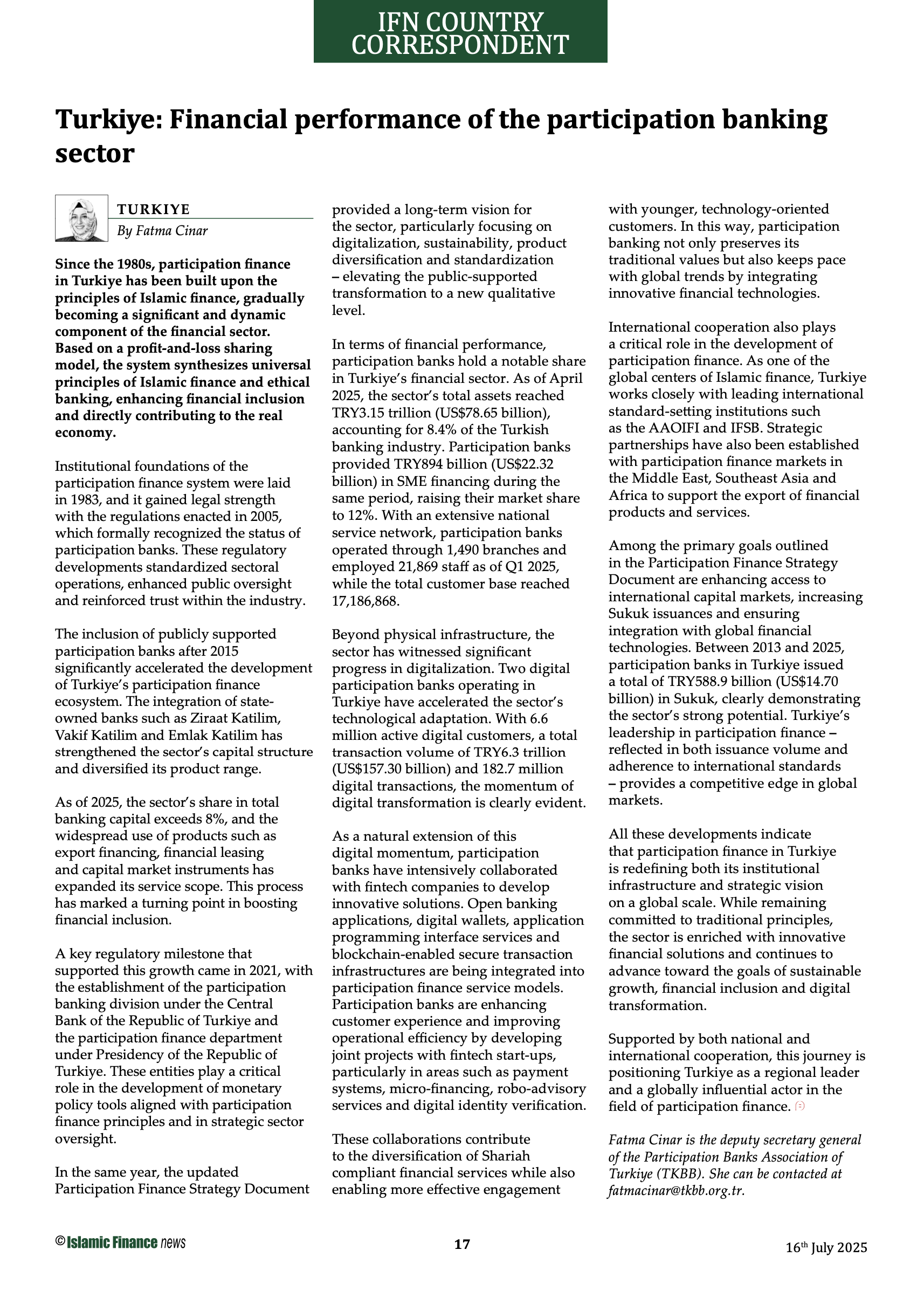By Fatma Cinar,
Since the 1980s, participation finance in Türkiye has been built upon the principles of Islamic finance, gradually becoming a significant and dynamic component of the financial sector. Based on a profit-and-loss sharing model, the system synthesizes universal principles of Islamic finance and ethical banking, enhancing financial inclusion and directly contributing to the real economy.
Institutional foundations of the participation finance system were laid in 1983, and it gained legal strength with the regulations enacted in 2005, which formally recognized the status of participation banks. These regulatory developments standardized sectoral operations, enhanced public oversight and reinforced trust within the industry.
The inclusion of publicly supported participation banks after 2015 significantly accelerated the development of Türkiye’s participation finance ecosystem. The integration of state-owned banks such as Ziraat Katılım, Vakıf Katılım and Emlak Katılım has strengthened the sector’s capital structure and diversified its product range.
As of 2025, the sector’s share in total banking capital exceeds 8%, and the widespread use of products such as export financing, financial leasing and capital market instruments has expanded its service scope. This process has marked a turning point in boosting financial inclusion.
A key regulatory milestone that supported this growth came in 2021, with the establishment of the Participation Banking Division under the Central Bank of the Republic of Türkiye and the Participation Finance Department under Presidency of the Republic of Türkiye. These entities play a critical role in the development of monetary policy tools aligned with participation finance principles and in strategic sector oversight.
In the same year, the updated Participation Finance Strategy Document provided a long-term vision for the sector, particularly focusing on digitalization, sustainability, product diversification, and standardization — elevating the public-supported transformation to a new qualitative level.
In terms of financial performance, participation banks hold a notable share in Türkiye’s financial sector. As of April 2025, the sector’s total assets reached TRY3.15 trillion (US$78.65 billion), accounting for 8.4% of the Turkish banking industry. Participation banks provided TRY894 billion (US$22.32 billion) in SME financing during the same period, raising their market share to 12%. With an extensive national service network, participation banks operated through 1,490 branches and employed 21,869 staff as of Q1 2025, while the total customer base reached 17,186,868.
Beyond physical infrastructure, the sector has witnessed significant progress in digitalization. Two digital participation banks operating in Türkiye have accelerated the sector’s technological adaptation. With 6.6 million active digital customers, a total transaction volume of TRY6.3 trillion (US$157.30 billion), and 182.7 million digital transactions, the momentum of digital transformation is clearly evident.
As a natural extension of this digital momentum, participation banks have intensively collaborated with fintech companies to develop innovative solutions. Open banking applications, digital wallets, API-based services, and blockchain-enabled secure transaction infrastructures are being integrated into participation finance service models. Participation banks are enhancing customer experience and improving operational efficiency by developing joint projects with fintech startups, particularly in areas such as payment systems, micro-financing, robo-advisory services, and digital identity verification. These collaborations contribute to the diversification of Shariah compliant financial services while also enabling more effective engagement with younger, technology-oriented customers. In this way, participation banking not only preserves its traditional values but also keeps pace with global trends by integrating innovative financial technologies.
International cooperation also plays a critical role in the development of participation finance. As one of the global centers of Islamic finance, Türkiye works closely with leading international standard-setting institutions such as Accounting and Auditing Organization for Islamic Financial Institutions (AAOIFI) and Islamic Financial Services Board (IFSB). Strategic partnerships have also been established with participation finance markets in the Middle East, Southeast Asia and Africa to support the export of financial products and services. Among the primary goals outlined in the Participation Finance Strategy Document are enhancing access to international capital markets, increasing Sukuk issuances, and ensuring integration with global financial technologies. Between 2013 and 2025, participation banks in Türkiye issued a total of TRY588.9 billion (US$14.70 billion) in Sukuk, clearly demonstrating the sector’s strong potential. Türkiye’s leadership in participation finance — reflected in both issuance volume and adherence to international standards — provides a competitive edge in global markets.
All these developments indicate that participation finance in Türkiye is redefining both its institutional infrastructure and strategic vision on a global scale. While remaining committed to traditional principles, the sector is enriched with innovative financial solutions and continues to advance toward the goals of sustainable growth, financial inclusion, and digital transformation. Supported by both national and international cooperation, this journey is positioning Türkiye as a regional leader and a globally influential actor in the field of participation finance.
Fatma Çınar is the deputy secretary general of the Participation Banks Association of Türkiye (TKBB). She can be contacted at fatmacinar@tkbb.org.tr.
This article was first published in IFN Volume 22 Issue 28 dated the 16th July 2025.
